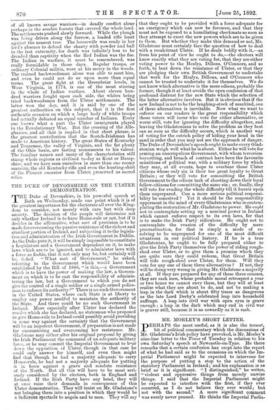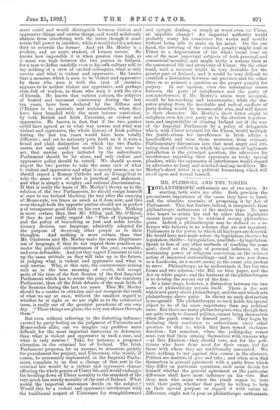MR. MORLEY'S SHORT LETTER.
PERHAPS the most useful, as it is also the tersest, bit of political commentary which the discussions of Mr. Gladstone's Irish policy have provoked, is Mr. Morley's nine-line letter to the Times of Tuesday in relation to his own Saturday's speech at Newcastle-on-Tyne. He there remarks that a certain confusion has crept into the report of what he had said as to the occasions on which the Im- perial Parliament might be expected to intervene for the purpose of putting a stop to the action of the statutory Parliament in Ireland ; and his explanation is as brief as it is significant. " I distinguished," he writes, "violent and oppressive things from merely unwise things. I said that the Imperial Parliament might be expected to interfere with the first, if they ever occurred, as I do not believe they ever would; but not with the second." A more significant comment was surely never penned. He thinks the Imperial Parlia- ment could and would distinguish between violent and oppressive things and unwise things, and would sedulously abstain from interfering with the latter, though it must retain full power to interfere, while it would feel it a solemn duty to overrule the former. And yet Mr. Morley is a student, and an acute student, of human nature. He knows how impossible it is when passion runs high, as it must run high between the two parties in Ireland, for a man to define candidly even to his own solitary self, to say nothing of a crew of excited colleagues, what is only unwise and what is violent and oppressive. He knows that a measure which is seen to be violent and oppressive by those who scan it with the eyes of enemies, appears to be neither violent nor oppressive, and perhaps even full of wisdom, to those who scan it with the eyes of friends. He knows that various policies, the subjects of heated and incessant controversy during the last ten years, have been declared by the Dillons and O'Briens to be patriotic and statesmanlike, when they have been branded with the most intense conviction, by both British and Irish Unionists, as violent and oppressive. He blows, in fact, that if the two parties could have agreed as to what was unwise and what was violent and oppressive, the whole history of Irish politics during the last ten years would have been totally different ; and yet he seriously puts forth as if it were a broad and plain distinction on which the two Parlia- ments not only could but would be all but sure to act, that unwise policy initiated by the subordinate Parliament should be let alone, and only violent and oppressive policy should be vetoed. We should as soon expect the two parties to take the same view of what violent and oppressive and what is merely unwise, as we should expect a Roman Catholic and an Evangelical to take the same view of what is jesuitical and dishonest, and what is simply a weighty and rational discrimination. If that is really the basis of Mr. Morley's theory as to the relation of the two Parliaments, he should resign himself al-, once to see Ireland blocking the way after the carrying of Home-rule, ten times as much as it does now, and this even though both the opposite parties should act in perfect aad transparent good faith on his own principle. Nothing is more certain than that Mr. Dillon and Mr. O'Brien, if they do not really regard the " Plan of Campaign " and the policy of boycotting as just and noble revolu- tionary devices, use language admirably adapted for the purpose of deceiving other people as to their thoughts. And nothing is more certain than that Mr. Gladstone and Mr. Morley make the same illegitimate use of language, if they do not regard these practices as, under the political circumstances of the case, excusable, and even defensible. And yet they expect Unionists to take up the same attitude as they will take up in the future, in judging what is violent and oppressive and what is only unwise. Why, at this rate, the controversies arising only as to the true meaning of words, will occupy more of the time of the first Session of the first Imperial Parliament which has to revise the policy of the statutory Parliament, than all the Irish debates of the most Irish of the Sessions during the last ten years. That Mr. Morley should be a master in criticism and not recognise the truth of what we say at once, without the smallest regard to whether he is right or we are right as to the substantial issue, is really one of the greatest paradoxes of our own day. " These things are glass; the very sun shines through them."
But even without referring to the distorting influence exerted by party feeling on the judgment of Unionists and Home-rulers alike, can we imagine any problem more difficult for the most impartial statesman to determine than what is violent and oppressive in such a case, and what is only unwise ? Take, for instance, a proposed alteration in the criminal law of Ireland. The Irish Parliament proposes, let us assume, to attenuate greatly the punishment for perjury, and Ulstermen, who would, of course, be necessarily represented in the Imperial Parlia- ment, complain to us that a change of that sort in the criminal law would be a violent and oppressive change affecting the whole genius of Ulster life, and would endanger the levelling down of Ulster morality to the standard of the very much less sturdy morality of the rest of Ireland. What would the impartial statesman decide on the subject ? Would this be a violent and oppressive interference with the traditional respect of Ulstermen for straightforward and upright dealing, or simply at worst even for Ulster, an impolitic change ? An impartial authority would probably worry his conscience for weeks and months without being able to make up his mind. On the one hand, the lowering of the criminal penalty might lead in Ulster to a degeneration of the whole social tone on one of the most important subjects of both personal and commercial morality, and might strike a serious blow. at the commercial life and prosperity of Ulster. On the other hand, such a measure might be very desirable for the greater part of Ireland ; and it would be very difficult to establish a distinction between one province and the other three on so primary a question as the proper penalty for perjury. In our opinion, even the substantial issues between the party of interference and the party of non-interference, if Mr. Morley's axiom were accepted, would be far-reaching and innumerable ; while the dis- putes arising from the inevitable and radical conflicts of party feeling would be innumerable also, and still fiercer in their character. Mr. Morley's short letter ought to enlighten even his own party as to the absolute hopeless- ness and impossibility of clearing Ireland out of the way of the Imperial Parliament by a policy of delegation which, with Ulster retained for the Union, would multiply the justifications for interference in Irish affairs a hundredfold, and raise them, moreover, from ordinary Parliamentary discussions into that most angry and irri- tating class of conflicts in which the question of legitimate jurisdiction is the principal question, the advocates for interference regarding their opponents as tricky special pleaders, while the opponents of interference would regard its advocates as fussy and mischief-making meddlers. Mr. Morley's short letter is a political boomerang which will recoil upon and wound himself.



































 Previous page
Previous page